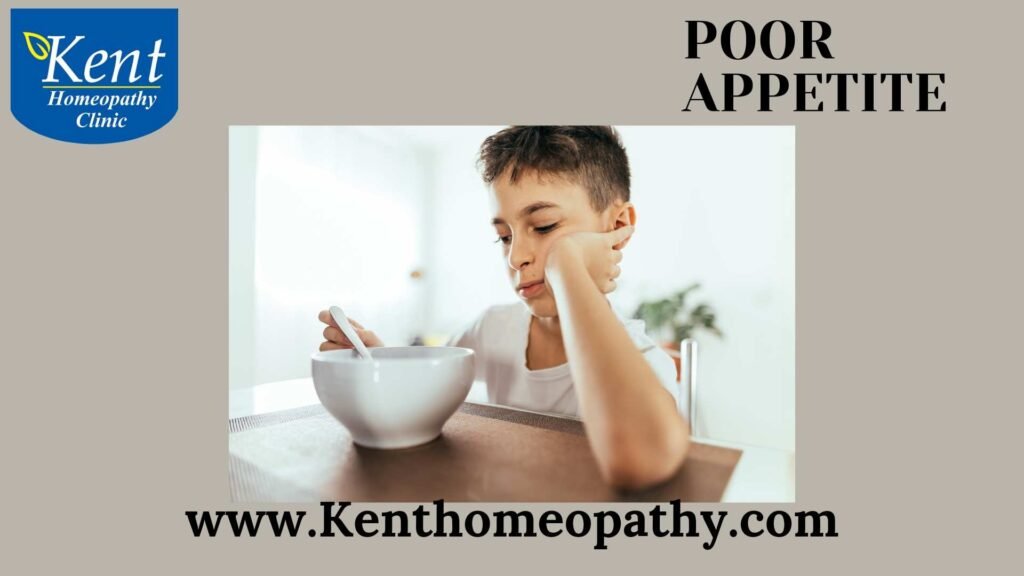Poor Appetite

Poor Appetite: Understanding Symptoms, Causes, and Types
Poor appetite, clinically referred to as anorexia, is a condition characterized by a reduced desire or interest in eating. While it’s common for appetite to fluctuate based on factors like stress or illness, persistent and unexplained loss of appetite can be a concerning health issue. Understanding the symptoms, causes, and types of poor appetite is crucial for effective management.
Symptoms:
- Reduced Food Intake:
– The primary symptom is a noticeable decrease in the amount of food an individual consumes compared to their usual eating habits.
- Weight Loss:
– Persistent poor appetite often leads to unintentional weight loss, as the body is not receiving sufficient nutrients.
- Fatigue:
– Inadequate nutrition can result in fatigue and a lack of energy, affecting daily activities.
- Nutrient Deficiency:
– Poor appetite may contribute to nutritional deficiencies, impacting overall health and potentially leading to other health issues.
- Changes in Taste Preferences:
– Individuals with poor appetite may experience alterations in taste preferences or find food less appealing.
- Digestive Issues:
– Constipation, indigestion, or other digestive problems can accompany poor appetite.
- Emotional Changes:
– Feelings of irritability, mood swings, or changes in emotional well-being may be associated with poor appetite.
Causes:
- Underlying Medical Conditions:
– Various medical conditions can lead to poor appetite, including chronic illnesses like cancer, kidney disease, liver disease, and infections.
- Mental Health Disorders:
– Conditions such as depression, anxiety, and eating disorders like anorexia nervosa can significantly impact appetite.
- Medications:
– Certain medications, such as chemotherapy drugs, antibiotics, or medications that affect the central nervous system, may cause a loss of appetite.
- Gastrointestinal Issues:
– Disorders like gastritis, peptic ulcers, or gastroesophageal reflux disease (GERD) can contribute to poor appetite due to discomfort during eating.
- Hormonal Changes:
– Hormonal imbalances, particularly thyroid disorders or changes in sex hormones, can affect appetite.
- Age-related Factors:
– Aging can lead to changes in taste perception and a decrease in appetite, affecting nutritional intake in older individuals.
- Chronic Pain:
– Persistent pain can suppress appetite, making it challenging for individuals with chronic pain conditions to maintain a regular eating pattern.
Types:
- Acute Poor Appetite:
– Often a response to an immediate illness, infection, or stress, acute poor appetite is typically short-term and resolves as the underlying cause is addressed.
- Chronic Poor Appetite:
– When poor appetite persists over an extended period, it may be indicative of a chronic condition, such as a long-term illness or mental health disorder.
- Medication-induced Poor Appetite:
– Some medications, especially those with side effects affecting the gastrointestinal system or central nervous system, can lead to a diminished desire to eat.
- Psychological Poor Appetite:
– Associated with mental health conditions, psychological poor appetite is often linked to mood disorders or eating disorders.
- Physical Poor Appetite:
– Resulting from physical health issues, this type is commonly seen in conditions affecting the digestive system, hormones, or other physiological functions.
- Age-related Poor Appetite:
– Seen predominantly in older individuals, age-related poor appetite can be influenced by factors such as changes in taste perception and decreased physical activity.
Conclusion:
Poor appetite is a multifaceted condition with diverse causes and manifestations. Recognizing the symptoms, understanding potential underlying factors, and seeking timely medical evaluation are essential steps in addressing this concern. Tailored treatment approaches, including lifestyle modifications, medication adjustments, and psychological support, can significantly improve appetite and overall well-being. If you or someone you know is experiencing persistent poor appetite, consulting with healthcare professionals is paramount for accurate diagnosis and appropriate intervention.
Contact to know more
Contact
Timings
Monday to Saturday:
11:00 AM to 02:30 PM
06:30 PM to 09:00 PM
